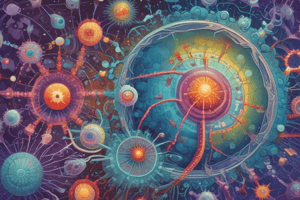Podcast
Questions and Answers
What is a key characteristic that distinguishes adaptive immunity from innate immunity?
What is a key characteristic that distinguishes adaptive immunity from innate immunity?
- Adaptive immunity involves memory response. (correct)
- Adaptive immunity does not involve cells.
- Adaptive immunity is present at birth.
- Adaptive immunity has a faster response time.
Which of the following accurately describes the role of B cells in the adaptive immune system?
Which of the following accurately describes the role of B cells in the adaptive immune system?
- B cells are responsible for direct cell killing.
- B cells participate exclusively in the innate immune response.
- B cells primarily activate macrophages.
- B cells produce antibodies in response to antigens. (correct)
Where do B cells primarily develop during gestation?
Where do B cells primarily develop during gestation?
- Lymph nodes
- Thymus
- Bone marrow (correct)
- Spleen
What role do bone marrow stromal cells play in B cell development?
What role do bone marrow stromal cells play in B cell development?
Which organs are considered primary immune organs where adaptive immune cells mature?
Which organs are considered primary immune organs where adaptive immune cells mature?
Where do B cells primarily differentiate into their functional form?
Where do B cells primarily differentiate into their functional form?
What is the primary function of plasma cells?
What is the primary function of plasma cells?
Which characteristic is NOT associated with plasma cells?
Which characteristic is NOT associated with plasma cells?
At what stage of human development are the progenitors of B cells first found?
At what stage of human development are the progenitors of B cells first found?
What happens to BCRs once B cells become activated?
What happens to BCRs once B cells become activated?
What is one of the primary functions of the adaptive immune system?
What is one of the primary functions of the adaptive immune system?
Which process is NOT associated with the humoral immune response?
Which process is NOT associated with the humoral immune response?
Where do B-cells primarily develop and differentiate?
Where do B-cells primarily develop and differentiate?
Which of the following statements about lymphocytes is FALSE?
Which of the following statements about lymphocytes is FALSE?
Which mechanism describes how antibodies prevent microbial spread?
Which mechanism describes how antibodies prevent microbial spread?
What type of receptors are displayed on B cells' surfaces?
What type of receptors are displayed on B cells' surfaces?
Which of the following statements about B-1 and B-2 cells is true?
Which of the following statements about B-1 and B-2 cells is true?
What characterizes the response of each B cell?
What characterizes the response of each B cell?
Where do B cells primarily develop?
Where do B cells primarily develop?
How do plasma cells differ from B cells?
How do plasma cells differ from B cells?
Flashcards are hidden until you start studying
Study Notes
Adaptive vs. Innate Immune System
- Adaptive system acts when the innate system fails
- Features:
- Immunological memory to recognize specific pathogens via antigens
- Antibody Production
- Humoral Immune Response - Prevents microbial attack using "fluids"
- Antibodies recognize microbial epitopes to:
- Immobilize microbes
- Prevent microbial attachment to host cells
- Promote microbial phagocytosis
- Target microbial destruction by soluble molecules or leukocytes
- Antibodies recognize microbial epitopes to:
- Cell-mediated Immunity- leukocytes destroy invading cells
Lymphocytes
- Produced in bone marrow but travel through the lymphatic system
- Differentiate in lymphoid tissues:
- Lymph Nodes
- Thymus
- Spleen
B Cell Development
- Hematopoietic stem cells in bone marrow become common lymphoid precursor (CLP)
- CLPs can differentiate into either:
- T cells: Develop in the thymus
- B cells: Remain in bone marrow
- B cell "graduates" can be differentiated by:
- Education level
- Arrival and departure from bone marrow
- BCR diversity
- Geographic distribution in the body
- Nature of responses to antigens
B Cell Basics
- Do not migrate to the thymus, develop within the bone marrow
- Arise from HSCs in the bone marrow, with two lineages:
- B-1 cells: Self-renewing population that dominates the plural and peritoneal cavities
- B-2 cells: Conventional cells, arise during and after the neonatal period, continuously replaced
- Widely distributed throughout lymphoid organs and tissues
- Each B cell is specific, producing immunoglobulin with one specificity, recognizing only one epitope.
- Diversity amongst B cells, each producing a single form of immunoglobulin, creates the overall diversity of the immunoglobulin response.
Plasma Cells
- Derived from terminally differentiated B cells
- Immunoglobulin-producing and secreting cells
- Characterized by basophilic cytoplasm, a nucleus with a stellate pattern, and a non-staining Golgi.
- Cease using immunoglobulin as a membrane receptor and secrete it into surrounding fluids.
- Secreted immunoglobulin is known as antibodies.
- Increase in size and metabolic activity to produce high quantities of immunoglobulin during their short lifespan.
B Cell Lineage Overview
- Progenitors of immunoglobulin-producing cells are found during gestation:
- 3rd week: Yolk sac
- 8th week: Fetal liver
- 12th week: Bone marrow
- Also called bone marrow-derived lymphocytes or B cells - this is where they differentiate.
- B cells synthesize immunoglobulin and display it on their surfaces as BCRs.
- Once activated, they differentiate into plasma cells which synthesize AND secrete their BCR as an antibody.
Studying That Suits You
Use AI to generate personalized quizzes and flashcards to suit your learning preferences.


